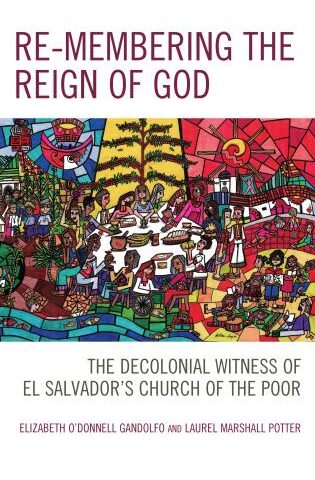
Re-membering the Reign of God
By
2.16.24 |
Symposium Introduction
Panelists
Judith Gruber
O. Ernesto Valiente
Annmarie Caño
Rufus Burnett
Melissa Pagán
Overview
What does it mean for an historically colonial church to become the “church of the poor” in a world marked by pervasive and persistent coloniality? Re-membering the Reign of God addresses this question through historical and theological reflection on the decolonial evolution of El Salvador’s ecclesial base communities (CEBs) in their own particular context of coloniality and prophetic hope. The CEBs’ witness represents a rich locus for decolonizing theology and challenging the whole church to join the church of the poor in its prophetic praxis of decolonial solidarity.
Reviews and Endorsements
This is one of the best books on ecclesiology in Latin America since Leonardo Boff’s spellbinding Church: Charism & Power. Elizabeth O’Donnell Gandolfo and Laurel Marshall Potter have done incredible work in the best tradition of liberation theology. From El Salvador, they show us in deep and expansive ways how poor people are moving and leading the church in Latin America. If you thought liberation theology is dead, read this book. If you thought the church is dead, read this book. If you want to understand how the poor are (again) re-making the church, read this book. And also, if you need songs, art, testimonies and histories about the people of God living with God in these deeply troubled times, please read this book.— Cláudio Carvalhaes, Union Theological Seminary
Catholic ecclesiology is reborn in these pages. This book proclaims that another world is possible. It proclaims this by remaining faithfully grounded in the vivid insights, lessons, images, and imagination of Salvadoran peoples who are lxs pobres. It proclaims this in its assertion that a preferential option for lxs pobres fundamentally requires decolonial knowing, being, and practice. It proclaims this in that reading this book is an exercise in decolonial praxis such that readers will be transformed affectively, imaginatively, intellectually, and spiritually. Superb scholarship. Beautifully written.— Nancy Pineda-Madrid, Loyola Marymount University
Elizabeth Gandolfo and Laurel Potter offer a fresh approach to the Comunidades Eclesiales de Base (CEBs) based on the strong bonds both authors have formed with the CEBs of El Salvador throughout years of companionship and engaged scholarship. Much has been said about the CEBs in the past 50 years. Rarely, though, does one hear their voices in scholarly works, especially in English. This riveting book forces the reader to reassess recent approaches to the CEBs in the anglophone academy that dismiss their continuous significance in the 21st century. Reasserting the CEBs’ ongoing production of knowledge and ways of being, Gandolfo and Potter model a theology that indeed stems from the practice of the pueblo, advancing a decolonial method that challenges views of a church of and for the poor, which reinscribe coloniality. This book deftly reaffirms the theological protagonism of Christian communities who proudly claim the identity of la Iglesia de los/las/lxs pobres as their own. As a historical sacrament of God’s reign, the CEBs pose a decolonial challenge to dominant forms of ecclesiastical structures, pointing to new possibilities of decolonial solidarity for those who benefit from the coloniality of power.— Raimundo C. Barreto, Princeton Theological Seminary
Re-membering the Reign of God is a must-read for anyone concerned with what it means to follow Jesus in the church today. Gandolfo and Potter write with deep compassion, honesty, and hope. Their work will inspire as well as challenge readers of all levels, from theological neophytes to experienced scholars. This book should become a classic in contemporary ecclesiology and an example of theological method for the coming century.— Mary Doak, University of San Diego
Embracing the prophetic imagination of El Salvador’s base ecclesial communities, Gandolfo and Potter offer an incisive critique of the structural sins of colonial legacies that mark Christianity in Latin America. Not content with remaining at the level of critique, the authors issue an urgent call to churches in the Global North to join in solidarity with the church of the poor and thereby journey en conjunto toward the reign of God. It is a timely and hopeful work.— Edgardo A. Colón-Emeric, Duke University Divinity School
Elizabeth O’Donnell Gandolfo and Laurel Marshall Potter have devoted themselves to standing with and learning from base communities of the poor in El Salvador. Guided by their gritty saving stories that are intertwined with those of their martyrs, Gandolfo and Potter identify the ingredients of a decolonial ecclesiology—the body of Christ imbued with the Spirit—being reborn.
In this process the control of the poor by colonial structures of economics, politics, racism, and gender subordination are undermined and overturned by indigenous epistemologies and cultures of music, painting, poetry, and cuisine that draw together the poor around their saving stories and liturgical actions as sources for ongoing resistance and hope.— Bradford Hinze, Fordham University
